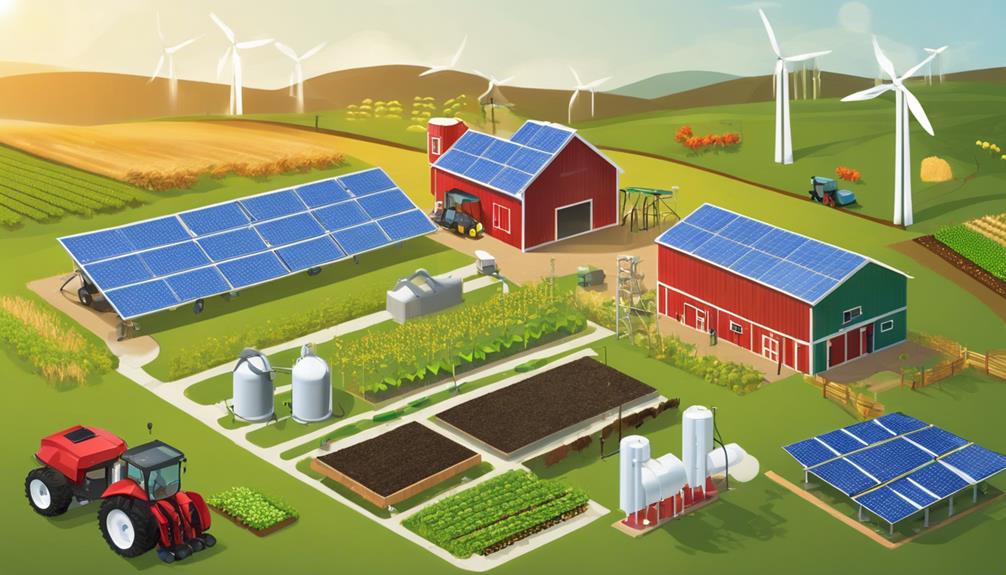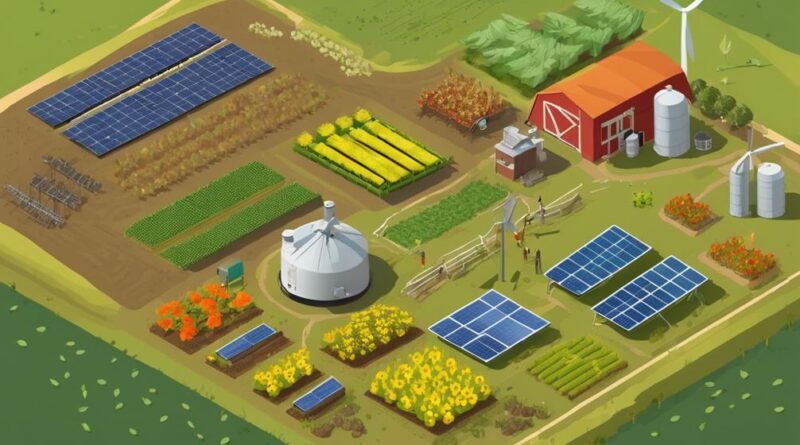Achieving Sustainability Goals Through Eco-Friendly Farming
Embrace eco-friendly farming to achieve sustainability goals. Opt for organic practices, minimizing environmental impact and enhancing nutrient retention. Prioritize soil health by cycling nutrients, using cover crops, and rotating crops. Conserve water with efficient methods like drip irrigation and rainwater harvesting. Preserve biodiversity by supporting wildlife, restoring habitats, and promoting ecosystem balance. Reduce your carbon footprint through regenerative agriculture and sustainable land management. Manage pests naturally, promoting environmental health and effective pest control. Enhance energy efficiency with renewables and proper equipment maintenance. Engage the community for sustainable farming support and collaboration. Begin your journey towards sustainable farming success with eco-friendly methods.
Importance of Organic Farming
Organic farming stands out as a crucial practice for sustainable agriculture due to its minimal environmental impact and focus on natural methods. By embracing organic farming, you tap into a range of benefits that contribute to both the health of the environment and the quality of the produce.
One of the key advantages of organic farming lies in its sustainable practices. Unlike conventional farming methods that rely heavily on synthetic chemicals, organic farming promotes sustainable farming practices that prioritize long-term soil health and biodiversity. Through the use of natural fertilizers, crop rotation, and biological pest control, organic farming minimizes harm to the environment while maintaining productive yields.
Another significant aspect is the improved nutrient retention in the soil. Organic farming techniques such as composting and cover cropping enhance soil structure and promote the retention of essential nutrients. This not only benefits the current crop yield but also ensures the fertility of the soil for future harvests. By focusing on building soil health through organic practices, you create a sustainable foundation for long-term agricultural productivity.
In essence, organic farming offers a holistic approach to agriculture that not only supports sustainable practices but also leads to improved soil health and nutrient retention. Embracing organic farming methods is a practical step towards achieving both environmental sustainability and agricultural resilience.
Soil Health and Fertility
Enhancing soil health and fertility is paramount for sustainable farming practices and long-term agricultural productivity. To achieve this, implementing practices such as nutrient cycling, cover crops, maintaining soil structure, and crop rotation are crucial.
Nutrient cycling plays a vital role in replenishing essential nutrients in the soil. By using cover crops like legumes, which fix nitrogen from the atmosphere, and then incorporating them back into the soil, farmers can naturally enhance soil fertility. This process also helps in reducing the reliance on synthetic fertilizers, thus promoting a more eco-friendly approach to farming.
Maintaining soil structure is another key aspect of soil health. Practices such as minimal tillage and avoiding compaction help in preserving soil structure, which is essential for promoting root growth and enhancing water infiltration. Additionally, crop rotation can help break pest and disease cycles, improve soil health, and increase overall crop yields.
Innovative approaches like no-till farming coupled with diverse crop rotations can significantly improve soil health and fertility over time. These practices not only benefit the environment but also contribute to the sustainability and long-term viability of agricultural operations. By prioritizing soil health and fertility, farmers can ensure the continued productivity of their land while minimizing negative impacts on the ecosystem.
Water Conservation Practices
To optimize sustainability on your farm, implementing efficient water conservation practices is imperative. Drip irrigation is a highly effective method that delivers water directly to the roots of plants, minimizing wastage through evaporation or runoff. By using drip irrigation systems, you can significantly reduce water usage while ensuring that your crops receive an adequate amount of moisture for optimal growth.
In addition to drip irrigation, rainwater harvesting is a valuable technique to conserve water on your farm. By collecting rainwater from roofs or other surfaces, you can store it for later use in irrigation or other agricultural activities. This practice not only helps in reducing your dependency on freshwater sources but also contributes to mitigating the impact of droughts or water scarcity.
Integrating these water conservation practices into your farming operations can lead to several benefits. Not only will you contribute to the preservation of water resources, but you'll also lower your water bills and increase the overall efficiency of your farm. By being mindful of how water is utilized and implementing innovative techniques like drip irrigation and rainwater harvesting, you can move closer to achieving your sustainability goals while maintaining a productive and environmentally friendly farm.
Biodiversity and Ecosystem Preservation
Preserving biodiversity and ecosystems is crucial for the long-term sustainability and resilience of your farm. By focusing on wildlife conservation and habitat restoration, you can create a balanced ecosystem that enhances biodiversity and ensures the health of your farm. Implementing practices that support wildlife conservation, such as creating wildlife corridors and preserving natural habitats, can help protect endangered species and promote a thriving environment.
Habitat restoration is another key aspect to consider. By restoring native habitats on your farm, you can provide essential resources for local wildlife and create a more resilient ecosystem. This can involve planting native vegetation, creating wetlands, or restoring degraded areas to their natural state. These efforts not only benefit wildlife but also contribute to the overall health of the ecosystem.
Furthermore, promoting ecosystem balance is essential for climate resilience. A diverse ecosystem can better withstand environmental challenges and adapt to changing conditions. By maintaining a balance between different species and habitats, you can help your farm cope with climate change impacts and ensure its long-term sustainability.
Incorporating practices that prioritize biodiversity and ecosystem preservation can lead to a more resilient and productive farm. By valuing the importance of wildlife conservation, habitat restoration, and ecosystem balance, you can create a sustainable environment that benefits both your farm and the surrounding landscape.
Carbon Sequestration Techniques
Implementing carbon sequestration techniques can significantly reduce the carbon footprint of your farm while enhancing its sustainability. By adopting carbon offsetting strategies and embracing regenerative agriculture practices, you can actively contribute to mitigating climate change effects. These climate-friendly practices not only benefit the environment but also improve the overall health of your farm's ecosystem.
Regenerative agriculture focuses on sustainable land management techniques that promote soil health and biodiversity. By implementing practices such as cover cropping, crop rotation, and reduced tillage, you can enhance carbon sequestration in the soil. These methods help to trap carbon dioxide from the atmosphere and store it in the soil, effectively reducing greenhouse gas emissions.
Incorporating agroforestry systems within your farm can also aid in carbon sequestration. Planting trees and perennial crops not only sequesters carbon but also provides additional benefits such as improved water retention and biodiversity support. Furthermore, integrating livestock into diversified farming systems can contribute to soil carbon sequestration through rotational grazing and proper manure management.
Reduced Chemical Usage
Reducing chemical usage on your farm can enhance sustainability and promote environmental health through innovative agricultural practices. By implementing natural alternatives for pest management, you can significantly decrease the reliance on synthetic chemicals while maintaining effective pest control.
One effective natural alternative is the use of beneficial insects like ladybugs or lacewings to control pest populations. These insects prey on harmful pests, reducing the need for chemical insecticides. Additionally, planting trap crops can divert pests away from cash crops, further minimizing the need for chemical interventions.
Crop rotation is another strategy that can help reduce chemical usage. By alternating the types of crops grown in a particular area each season, you can disrupt pest life cycles and reduce the buildup of pests that are specific to certain crops. This method can also improve soil health and fertility, contributing to overall sustainability on your farm.
Furthermore, employing techniques such as companion planting, where certain plants are grown together to deter pests or attract beneficial insects, can create a natural pest management system. For example, planting marigolds near tomatoes can help repel nematodes, reducing the need for chemical nematicides.
Incorporating these natural alternatives into your farming practices can not only reduce chemical usage but also promote a healthier environment for your crops, wildlife, and surrounding ecosystems.
Energy Efficiency in Farming

To optimize your farm's sustainability and operational efficiency, consider enhancing energy efficiency practices in your agricultural operations. By utilizing renewable resources and implementing sustainable practices, you can significantly reduce energy consumption and lower your farm's carbon footprint.
One innovative way to improve energy efficiency on your farm is by investing in solar panels. Solar energy is a clean and renewable resource that can power various aspects of your operations, such as irrigation systems, lighting, and equipment. By harnessing the power of the sun, you can decrease your reliance on non-renewable energy sources and save on electricity costs in the long run.
Another practical approach to enhancing energy efficiency is through proper equipment maintenance and upgrading to energy-efficient machinery. Regular maintenance not only ensures that your equipment operates at peak performance but also helps in conserving energy. Additionally, replacing old machinery with newer, more energy-efficient models can lead to significant energy savings over time.
Incorporating energy-efficient practices into your farming operations not only benefits the environment but also contributes to cost savings and improved sustainability. By embracing renewable resources and implementing sustainable practices, you can take proactive steps towards achieving a more energy-efficient and environmentally friendly farm.
Community Support and Engagement
Engage with your local community to foster support and collaboration for sustainable farming practices. Building strong community relationships is crucial for the success of eco-friendly farming initiatives. One way to achieve this is through volunteer initiatives. By inviting community members to participate in activities like tree planting, composting, or educational workshops, you not only spread awareness about sustainable practices but also create a sense of ownership and pride within the community.
Local partnerships play a significant role in advancing sustainability goals. Collaborating with local businesses, schools, or organizations can help broaden the impact of eco-friendly farming practices. For instance, partnering with a nearby restaurant can create a direct market for your organic produce, fostering a sustainable local economy. Moreover, working with schools to incorporate educational programs about sustainable agriculture can inspire the next generation to value and support eco-friendly farming methods.
Public education is key in garnering community support. Hosting farm tours, workshops, or informational sessions can help dispel myths and misconceptions about sustainable farming. It also provides an opportunity for dialogue and feedback, strengthening the bond between farmers and community members. Farmer collaboration is another essential aspect of community engagement. By sharing knowledge, resources, and best practices with fellow farmers, you can collectively work towards a more sustainable and resilient agricultural sector.
Conclusion
By embracing eco-friendly farming practices, you can contribute to achieving sustainability goals. From preserving soil health to conserving water and promoting biodiversity, every small step makes a difference.
By reducing chemical usage and increasing energy efficiency, you can create a more sustainable farming operation. Engaging with your community and sharing knowledge can further support these efforts.
Together, we can work towards a more sustainable future through eco-friendly farming practices.
